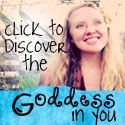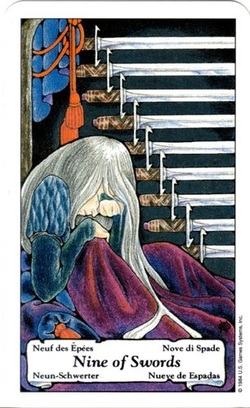 There are a lot of eye-rolling cliches about how talking to yourself is a sign of some kind of instability, the first sign that you're "losing it." It means you're fragmented, freaking out, unable to "keep it together."
Personally, I think it's a great idea. And I keep on learning new ways to do it.
You know the old jokes in cartoons, when you get a look at a character's brain? There are all these little mini-selves running around, like highly specific Smurfs. 'Anger' sets his head on fire at the slightest insult. 'Love' is scattering flowers. 'Fear' is cowering in a corner, trembling at every little noise.
Of course, it's never that easy to pick specific things out. Emotions are complicated, wrapping themselves in layers and sometimes carrying two completely contradictory feelings at once. It can seem like a huge, frightening task to even sort through all your feelings, let alone pick them out and give them a face.
But maybe that's exactly what we need to do sometimes. Take a look at the complicated thought that's been hanging on to you for a while, keeping you blocked or sad or overwhelmed. Start picturing it as a person. What does it look like, and how does it dress? What's its body language? Does it have a name? Draw it, if you're artistic.
Set aside ten or fifteen minutes where you can sit quietly, undisturbed. Then turn in towards that feeling and have a conversation with it. Introduce yourself to it, and ask what it's doing there. Learn who it is, and make friends with it. Find out what it needs. See if you can transform it, and find some positive work for it to do.
Any kind of communication with yourself is just one more form of meditation. And the more we sort through and get to know ourselves, the more we're able to transform ourselves into stronger, happier people.
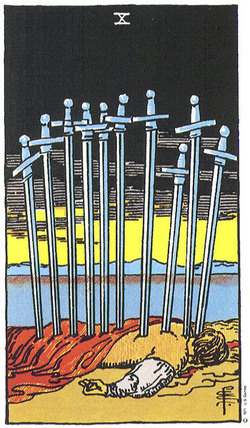 Have you ever encountered something that just makes your eye start twitching and your fingers start drumming? The kind of thing where no matter how much you try to practice non-judgmental bliss, it can sometimes just get to you? Here are a few things I've seen in Tarot that get under my skin.
1. "Gypsy" fortune teller acts. First of all, "Gypsy" is actually a really insensitive word. A lot of people don't know this, so don't feel horrible if you used it up to now or anything. But it's a big-time slur in Europe, and it isn't even accurate, considering it was used to refer to the Romani people because they "looked Egyptian" and no one could be bothered to ask them for the facts. Kind of like "Indians" referring to Native peoples in North America.
The actual semantics aside, if you're reading Tarot more for the entertainment than the counseling angle - and that is totally fine, seriously, as long as you make it clear that's what it is - then you can probably find a sparkly costume to do it in without an accent and the words "cross my palm with silver." Come on, guys. There are like six stereotypes that plays on, and not enough people know what they really refer to.
2. "Bad" cards. People who are reading for themselves tend to do this. A reversal is "bad". The high Swords cards or the Tower are "scary". The Star in the "what to watch out for" position means "you are heretofore advised to throw yourself into a pit of despair and never be optimistic again."
You can read everything super-literally if you want, and I get it if you want the cards to just serve up a slice of truth: "No, the job probably isn't on the way. And also you should probably look out for the bolt of lightning that's going to shake your world up. Just warning you." But I feel like I'm watching a mime box himself in. The problem isn't how you're reading, when you do it this way, it's how you're responding to what it says. I honestly can't, in my heart of hearts, believe your inner guidance and a hand from the Universe is simply saying "Your life will suck right now."
Why is there going to be a bolt from the blue, or a feeling of total despair? You're never helpless in your life, and rarely does anything just happen to you, so determine what's going to show up in your world and decide how you want to feel about that. Adjust circumstances accordingly. Maybe you're not supposed to get the job because there's a better one on the way. Or the sudden, painful revelation will lead to you reinventing your world in a way you'd never have been able to before. Tarot is never just about things happening to you. It's about looking at the road you're on, where it's leading, and if you want to change direction.
3. "They're doing it wrong!" Yes, before you ask, I see the irony here. But seriously, I can't stress this enough. Yes, there are close-minded ways of catering your reading to exactly what you want to hear, or responding to your reading from a place of fear. And that's not good for your learning, or what you get out of reading Tarot. But I'm talking about the methods you pick up and the teachers you choose. There is no end-all-and-be-all as far as that's concerned. The only way you could possibly be "doing it wrong" is if you learn one way, stop there, and refuse to learn anything else. The more information you gather, the more you can decide for yourself what's worth doing and how.
But, here's the real reason for this one: even if you work for years and decide the best way to learn or teach or read the cards or whatever else, please don't be a jerk about it. I have seen a few Tarot experts and instructors call each other out, often by name. I've seen them get judge-y for having a different opinion, teachinga certain way, charging a certain amount of money. I can't think of anything that turned me off faster than watching a seminar from an instructor, and listening to them smugly outline how their teaching was superior to someone else's book.
Everyone learns differently. Everyone responds to the cards differently. Don't limit yourself by stereotypes, by fear, or by inaction. But most of all, don't ever limit someone else by telling them there's only one way to tap into the cards. Tarot is far too elaborate, magical, and full of potential for that.
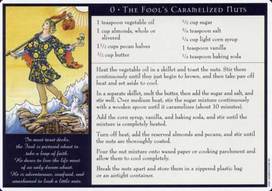 One of the many awesome things about Tarot is just how diverse it is. Even when a lot of what's out there is copying the familiar images of the Rider-Waite Tarot, its variations are like giving a new spin to a familiar friend. And when Tarot does step out of that box? There's a whole list of things you can discover. Here's a few on my wishlist. - Astrology. The Golden Dawn and other esoteric organizations found that with a tiny bit of wiggling, Tarot corresponds to astrology and makes a pretty excellent teaching tool. The Celestial Tarot talks about those direct associations, and has some really gorgeous art to help you learn a little about Tarot and the stars.
- Crystals and Herbs. Magickal types love associations, so I'm going to give you a two-for-one here. The Crystal Tarot links Tarot to gemstone therapy, and if you want to learn herbcraft, there's a Tarot for that too.
- Fairy Tales and Myths. Modern Tarot interpretations are all about archetypes, and there are some universal archetypes - and some that change based on the time and nation of the telling. Fairy tales? Here, have two decks with tales from all over the world. Religion and mythology? (To be inclusive, let's say one man's myth is another man's gospel.) Arthurian, Celtic, Christian, Greek, Egyptian, Norse, even a well-researched deck about several Native American tribes, the Tarot runs the gamut.
- Recipes. There are two different decks that create recipes based on the cards, one with just the Major Arcana and one with 78 different recipes for an entire deck. And as a bonus? A deck that tells the entire history of chocolate. I'm pretty sure that's something I never knew I always wanted.
- Science. I'm pretty useless when it comes to science and math, but the Quantum Tarot somehow combines Tarot with quantum physics, and that is pretty damn awesome.
Did I leave out any of your favorites? Anything on the same subject with better research? Leave me a comment, I'd love to hear from you!
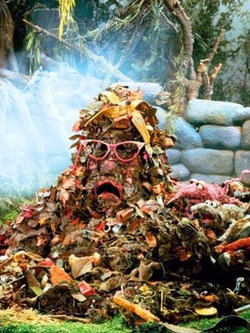 I've been rewatching a lot of Fraggle Rock lately, since my girlfriend with a decidedly HBO-deprived childhood has never seen it. Yeah, yeah, I'm a grown-up and I'm supposed to be above these things. But screw my credibility. There's a lot of simple wisdom in kids' stuff that we don't really remember to touch as adults, and it's Jim Henson, creator of the Muppets and Sesame Street, which should say it all.
And Fraggle Rock? Has to be the most pagan show I've ever seen. A living, breathing system of caves that teach about the interconnectedness of life? A festival where you compose tributes to the full moon? And if you want to teach a newly-minted teenaged Wiccan about why she can't be initiated just yet, just show her "Mokey and the Minstrels".
Then there's Marjory the Trash Heap, the "all-knowing" oracle who pings me quite a bit for obvious reasons. She demonstrates some genuine power and insight towards the end of the series, but mainly Marjory is kind of a shyster - someone who gives you not-quite-groundbreaking sayings or junk objects in the form of talismans. She does claim to be all-knowing, but the Trash Heap doesn't really take payment for her services. She's more than happy to dispense a little bit of cryptic practicality, watch the Fraggles mistake it for deep wisdom, and then let them work out their own problems with this new bit of direction. Her ultimate goal is the goal of all great oracles: to no longer be needed.
And often, the magic works. Anxious Boober feels a surge of courage when clutching a bottlecap inscribed with the words "no deposit, no return." Red and Wembley learn the charm of spilling a bottle of milk and pointedly not crying over it, which gives them the confidence to finally stop worrying and make a plan.
What Fraggle Rock knows, and what Tarot readers know, is that objects and sayings aren't the important thing. There are literal "junk oracles", where you draw discarded odds and ends out of a bag and make observations based on what you find/the meanings you attach. And they're much the same as Tarot's lovely, inspiring, and extremely subjective art. The power is in the reader, whether that's intuition or just plain common sense. It connects us to the magic of the world, taps us into something bigger.
The insights from divination are personal insights, a little nudge in the right direction. They encourage someone to understand the situation and get moving, with the confidence that they knew a little more about themselves and their path than they did half an hour ago. There's a tremendous, often magical power in that. And the greatest power of all, of course, is that you can put a little of your focus and intention into the world - and get a great deal back out of it, no matter what tools you use.
"No deposit, no return."
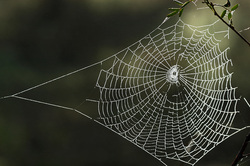 It's nearly a year ago to date. Attending a Lammas celebration, I go to a Tarot reader participating in the festival. She gives me a lot of wonderful advice about the new direction my life is moving towards, and the evolution I'm about to go through. She rightly tells me that in just six months, my entire outlook on life will be different.
She then speaks in extensive warnings about the man who will enter my life that I shouldn't trust with my heart, as he's just looking for a handout. She explains that I'll then meet a man I slowly grow closer to, and enter a more serious relationship with him.
I don't remember the exact details because at that point I had zoned out - when I wasn't exchanging glances with my long-time girlfriend of eight years, who was sitting on the chair right next to me.
As it happens, we did experience a period of growing much closer right around the timestamp this reader gave me. And some male friends were involved, but not in the way the reader said. It's not that this person was completely inaccurate in terms of my reading. She wasn't dead-on, but if you thought outside the box some of her advice was invaluable. But right away she'd made some assumptions about who I was and what I wanted out of life. And that was where she'd lost me.
It's not that this person was homophobic, or a bad person in any way. Really, any time we fail to be inclusive, we're a product of our environment. Ignoring the way our whole society focuses on one kind of person: how many decks that aren't made specifically for gay men feature a heterosexual Lovers card? How many genderqueer or trans people can you find in any Tarot deck? People over a certain weight? People who aren't white, which is thankfully becoming less of a problem, but I still see decks where there's not a single brown, black, or Asian face to be found.
Hell, you could even argue that the very construction of a Tarot deck - the quiet, intuitive High Priestess and the motherly Empress, the power-wielding Emperor and forceful Magician - is rooted in a certain set of gender roles. And Tarot came from the 15th century, so that's to be expected. But when do we challenge that, and what does it do to our preconceived ideas?
When you read for strangers, even if you're divining their lives, it's important to not assume the way those lives work. Even if we're not licensed therapists, a lot of us consider ourselves to be in service positions. That means we're meant to illuminate and empower the lives of our clients - and we can hardly do that when we don't realize a client is in a poly relationship, or asexual, or only feels female some of the time. It's not really our business to ask, but it's our job to know that these are possibilities - and that if we're operating in the web of life, sometimes there are strands we never even imagined we'd land on.
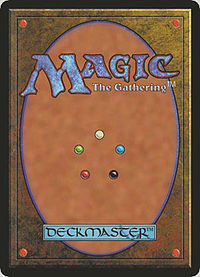 You know how some people get brilliant flashes of inspiration in the shower? My completely un-brilliant flash went like this:
By all evidence, history shows us that Tarot originated in the mid-15th century as a card game called tarocchi. Each card in the Major Arcana represented a different rule that applied to the actual game. There's a lot of discussion about whether the Tarot also hid certain pagan ideas (unlikely, since earlier decks were very medieval Christian), or was used in teaching religious allegory to kids. But as far as history suggests, Tarot became used for divination because a lot of things are used for divination: tea leaves, entrails, playing cards (a method that pre-dates Tarot cards as a game or an oracle, I believe).
Now, this doesn't overturn Tarot's legitimacy one bit. First of all, Tarot spoke to people as a teaching tool and an oracle because it works with archetypes, very universal figures and ideas. The images were inspiring, and really that's all divination takes: taking a look at something as a lens through which you view your life and your future. You can divine using toothpicks, coins, or clouds, so long as you have a consistent meaning attached to them. The magic is in you and in the Universe. Tarot is just a very creatively inspiring tool, one that happened to link up very easily to a lot of pre-existing ideas, and became a very effective method for teaching them.
So effective, in fact, that Tarot's popularity as an oracle grew in the 1800s, when a man named Antoine Court de Gebelin was convinced that Tarot originated in Egypt and represented Egyptian mysteries. He wrote a paper alleging a lot of connections, and others picked up on it. (Scholarship was like that a lot, back then, and Egypt fever was alive and well.) And the idea that Tarot came from Egypt, and even Atlantis, survives to today.
Now, my grand revelation? Tarot started out as a card game with a series of characters that can alter the rules of what each player is allowed to do. And amazingly, we have card games like this all the time today, mainly in the form of trading cards. Pokemon has a card game similar to this, and an American version is Magic: The Gathering. And my absolute favorite weird bit of synchronicity? A card game from Japan called Yu-Gi-Oh, where the game's fictional mythos is that it was originally played in Egypt, commanding real magickal forces, and slowly evolved into a children's game years into the future.
In some ways, Tarot is a reverse-engineered Yu-Gi-Oh - a game my now-adult brother played a lot as a kid. When I informed him of this connection, he burst out laughing. And then, after a pause, he added: "History is weird."
I had to agree.
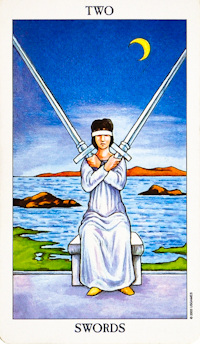 When you're first starting out while reading Tarot cards, there's a tendency to second-guess yourself. I can still remember all the things I used to say to myself in the beginning. "I haven't shuffled enough, that's why this card keeps reappearing." "There's too many reversals for this to really be accurate." "I really need to learn to shuffle better, a card just flew out from the deck mid-way through. Now I can't possibly draw it or it's a biased reading in some way." Here's the thing: in Tarot, there aren't really mistakes.I'm not saying you can't give a bad reading. And not everyone's going to agree with me - I remember Dan Pelletier's "The Process" saying that once a card flies out of a deck during shuffling, "you've lost all credibility with your sitter," and I can understand exactly why he'd say so. But I also remember The Devil practically shooting out from my hand during one shuffling. And I proceeded to lay it on the table, and ask if addiction had recently come into play for my sitter. As it turned out, her son was in prison for some of the things he'd done while on drugs. I pay attention to the cards that shoot out of my hand as additions to the reading now, and it never fails. Repeating cards? Those are a capital-M Message for you, one you need to really grasp the meaning of when they show up. They'll haunt you across multiple decks until you really figure it out. Too many reversals? Maybe see reversals in a different light for this reading - as cards that are blocked/scattered energy, or energies you need to pay attention to. Ask three Tarot readers and get five different answers. But the important thing here is that Tarot reflects what's going on in the world, and inside you, so it's a beautifully adaptable tool to whatever might happen. What's important is really your reaction, the connections you make. Your mistakes might tell you more about your question than a reading that's perfect, smooth sailing. Agree? Disagree? I'd love to hear your personal interpretation of events like these in the comments!
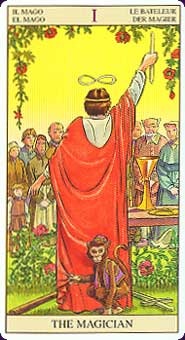 There are hundreds of sites out there talking about how to read Tarot, and how each reader personally sees the cards. Personally, I love them all. They enhance my own insights and style, they make me a better reader.
But there's so much more the cards can do. Italo Calvino's book The Castle of Crossed Destinies has his characters unable to speak, telling their stories purely through Tarot images. The archetypes are so powerful, they can do a lot of speaking for us in the ways we least expect.
Here are five ways Tarot can be turned into a game or a creative tool.
- Cast your favorite characters into roles.
Think of your favorite piece of media - TV shows, movies, books. If they could fit into Tarot cards, who would they be? My nerdy little heart loves to do this with Disney characters, imagining Dumbo as the Fool, Bambi's mother as the Empress, and Doctor Facilier as a wicked, reversed version of The Magician.
- Create a storytelling Round Robin.
You can do this alone or in a group. It's a lot like campfire stories: after shuffling, one person draws a card, and says "There once was...a great and glorious hero, who drove a fearsome Chariot." (Just for an example.) Then the next card drawn continues the story: "One day this hero came across two children, giving each other gifts." See what comes out of the story you tell!
- Have an interview.
This is especially great to do if you're writing a book. Come up with a handful of questions for a character you're writing, and see what cards you draw for each question. Or reverse it - interview one of the Major Arcana about what they have to teach you, or their philosophy on life. You may be surprised at the new depths you find.
- Expand your vision.
One deck I need to get my hands on is the "Tarot of New Vision", a deck that takes familiar images from the Rider-Waite Tarot and turns them 180 degrees, so you can see a new perspective on the card. Imagine what's happening in the cards just offscreen, or behind the figure you see. Or look at one special detail in the cards, and zero in on it. How did the Magician receive his ouroboros sash? What's in the boats the figure in the Two of Wands is looking at? Write a journal entry or a story about it!
The best part of all this: while you use these games and story ideas to have fun, you're also learning to get closer to the cards, and be a better reader! See what new insights open up for you.
Okay, so maybe none of these things are strictly forbidden. But a lot of them are the dreaded "woo-woo", a little too esoteric and strange for people who are busy and concerned with appearances (and miserable!) to look at where and how they find wisdom, strength, and a good recharge.
I read Tarot - I look at a series of randomly-drawn picture cards that are the subject of Hollywood movies, Simpsons jokes, and racist Gypsy stereotypes. To a lot of people, I'm sure I look ridiculous. But I've found some of the most profound wisdom (and connection with the Divine as I experience it) from those randomly-drawn picture cards. Sometimes we have to be unafraid to look a little silly, if it gives us meaning. And that's what today's post in the series is all about.
3. Watch tons of TV (and movies, and theatre, and read tons of comics, and books, and listen to all kinds of music, and...)
Look, I'll tell you a secret: there IS no "highbrow" or "lowbrow" entertainment. While a book might stretch your imagination a little more than images that are all picked out for you, there's no reason you'd be better, smarter, or happier reading War and Peace than you would watching old reruns of Fresh Prince of Bel Air.
It all comes down to what's important to YOU. I could wring more personal meaning out of a Saturday morning cartoon than a David Lynch film. I'll prove it to you: you know Spongebob Squarepants? The goofy yellow undersea sponge who's been around for, wow, nearly fifteen years now? Spongebob's favorite thing in the world is his job: working as a fry cook at what's basically an underwater Burger King. And that's because Spongebob views his job as literally the most important thing there is. He takes joy in what he does. He makes it creative. He thinks that doing good work, making a good meal the way a customer wants it, is an awesome thing. He doesn't feel that way because some corporate propaganda told him that; it's because he was that passionate from the start. I look at that, exaggerated in the way only a kids' show can make it, and I start thinking about what could make me that passionate and proud of what I give to the world.
See how that works? That's why it's important to stretch your horizons. Take in as many different things, through as many different mediums, as possible. Take in media about people of different ethnicities and sexualities and gender identities. Learn the true story movies are supposedly based on. Fall in love with culture, with stories, in all of its forms. Somewhere in there is the next message you need to hear.
Want to misbehave - and feel like a better person at the end of it all? I've been giving some thought to all the things we were told not to do as kids, maybe even as adults. And the more I look at it, the more I see that some of my favorite things to do are things that color outside the lines. They make me smarter, more thoughtful, and lesss afraid of "doing it wrong." Most importantly, they make me feel more like MYSELF, in all my unique glory.
This article is going to spread out over a few days, so take today to reflect on the first two in the list and experiment. Take a look and see if you've been doing any of these things too!
1. Daydream
Okay, to be fair, the subconscious isn't a secret anymore. If anything, it's become a joke at this point. "The house in the dream represents your mind, and that train entering the tunnel...uhm, let's move on." But our imaginations are filled with so much amazing potential. And they can tell us so many things when we're not even looking for it. If anything, that's what Tarot is all about - using images to unlock our imaginations and the stories we tell ourselves.
Even if you don't get a subconscious breakthrough, or a message from the angels/saints/deities of your choice, you ARE going to find out what makes you tick: what excites you, attracts you, wakes your mind up when the day-to-day just doesn't. Take a look at the things you imagine, both asleep and awake. Hell, take a look at the things you doodle on an envelope while you're talking on the phone. Chances are you'll find at least one thing about yourself that you've never noticed before.
2. Talk to yourself
You won't look "crazy." Sure, schizophrenics do this, but so does everyone else while we're puttering around the kitchen; it's a good way to organize our minds. But there's another trick to the wide world of spiritual discovery, and you don't even need a meditation or a summoned spirit guide to do it - though they help!
The next time everything is a mess, light a candle or two and put on some relaxing music. Then just lie down in your bed and have a long conversation. Imaging yourself in a place that feels beautiful, calming, and safe - and imagine meeting yourself there to chat. Maybe you're meeting "you" from five years down the line, when all these worries are going to seem like a blip on the timeline of your life. Maybe you're meeting "you" from your childhood, or some hurt you can't let go of. It could be "you" from this minute, right now - but what's important is you sit and talk. Just let your mind be free and imagine what you have to say to yourself. It might feel like you're making it up; maybe you are and maybe you're not. But what you find can certainly help.
|








 RSS Feed
RSS Feed
